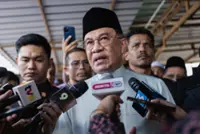TOKYO: Economic policymaking in the 2020s and beyond needs to take into account the circumstances surrounding three global megatrends: geopolitics, digitalisation and climate change, said Prime Minister Datuk Seri Anwar Ibrahim.
While countries may not have control over external factors wreaking havoc elsewhere globally and leaving a trail of economic challenges in our backyard, straightforward preemptive measures have boosted confidence that Malaysia's economic footing will not be shaky.





